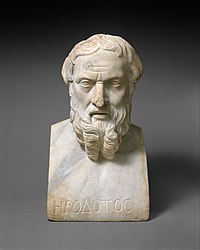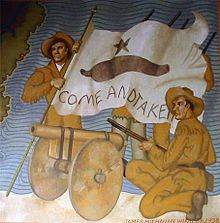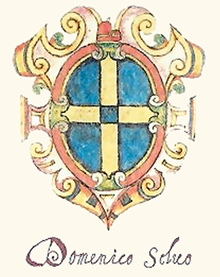Portal:History
The History Portal

Herodotus (c. 484 BC – c. 425 BC) is often
considered the "father of history"
History (derived from Ancient Greek ἱστορία (historía) 'inquiry; knowledge acquired by investigation') is the systematic study and documentation of the human past. History is an academic discipline which uses a narrative to describe, examine, question, and analyse past events, and investigate their patterns of cause and effect. Historians debate which narrative best explains an event, as well as the significance of different causes and effects. Historians debate the nature of history as an end in itself, and its usefulness in giving perspective on the problems of the present.
The period of events before the invention of writing systems is considered prehistory. "History" is an umbrella term comprising past events as well as the memory, discovery, collection, organization, presentation, and interpretation of these events. Historians seek knowledge of the past using historical sources such as written documents, oral accounts or traditional oral histories, art and material artefacts, and ecological markers.
Stories common to a particular culture, but not supported by external sources (such as the tales surrounding King Arthur), are usually classified as cultural heritage or legends. History differs from myth in that it is supported by verifiable evidence. However, ancient cultural influences have helped create variant interpretations of the nature of history, which have evolved over the centuries and continue to change today. The modern study of history is wide-ranging, and includes the study of specific regions and certain topical or thematic elements of historical investigation. History is taught as a part of primary and secondary education, and the academic study of history is a major discipline in universities.
Herodotus, a 5th-century BCE Greek historian, is often considered the "father of history", as one of the first historians in the Western tradition, though he has been criticized as the "father of lies". Along with his contemporary Thucydides, he helped form the foundations for the modern study of past events and societies. Their works continue to be read today, and the gap between the culture-focused Herodotus and the military-focused Thucydides remains a point of contention or approach in modern historical writing. In East Asia a state chronicle, the Spring and Autumn Annals, was reputed to date from as early as 722 BCE, though only 2nd-century BCE texts have survived. The title "father of history" has also been attributed, in their respective societies, to Sima Qian, Ibn Khaldun, and Kenneth Dike. (Full article...)
Featured picture
Did you know (auto generated)

- ... that Massachusetts gave the United States its first openly LGBT state legislator to be elected, as well as the first out congressperson and state attorney general?
- ... that Elisabeth Griffith's sweeping 100-year history of the American equal-rights movement has been compared to listening to Billy Joel's "We Didn't Start the Fire"?
- ... that despite his distinguished family history, musicologist Yuri Shcherbinin told friends that "what matters most is what you are, not who your ancestors were"?
- ... that Jake Bates's first in-game field goal was the second-longest in professional football history?
- ... that during the first tour to the Soviet Union by any American ballet company, Lupe Serrano danced the first encore in the American Ballet Theatre's history?
- ... that Seattle Reign FC have had three name changes during their 11-year history?
Abū Bakr Muḥammad ibn Ṭughj ibn Juff ibn Yiltakīn ibn Fūrān ibn Fūrī ibn Khāqān (8 February 882 – 24 July 946), better known by the title al-Ikhshīd (Arabic: الإخشيد) after 939, was an Abbasid commander and governor who became the autonomous ruler of Egypt and parts of Syria (Levant) from 935 until his death in 946. He was the founder of the Ikhshidid dynasty, which ruled the region until the Fatimid conquest of 969.
The son of Tughj ibn Juff, a general of Turkic origin who served both the Abbasids and the autonomous Tulunid rulers of Egypt and Syria, Muhammad ibn Tughj was born in Baghdad but grew up in Syria and acquired his first military and administrative experiences at his father's side. He had a turbulent early career: he was imprisoned along with his father by the Abbasids in 905, was released in 906, participated in the murder of the vizier al-Abbas ibn al-Hasan al-Jarjara'i in 908, and fled Iraq to enter the service of the governor of Egypt, Takin al-Khazari. Eventually he acquired the patronage of several influential Abbasid magnates, chiefly the powerful commander-in-chief Mu'nis al-Muzaffar. These ties led him to being named governor first of Palestine and then of Damascus. In 933, he was briefly named governor of Egypt, but this order was revoked after the death of Mu'nis, and Ibn Tughj had to fight to preserve even his governorship of Damascus. In 935, he was re-appointed to Egypt, where he quickly defeated a Fatimid invasion and stabilized the turbulent country. His reign marks a rare period of domestic peace, stability and good government in the annals of early Islamic Egypt. In 938 Caliph al-Radi granted his request for the title of al-Ikhshid, which had been borne by the rulers of his ancestral Farghana Valley. It is by this title that he was known thereafter. (Full article...)
On this day
January 12: Zanzibar Revolution Day in Tanzania (1964)
- 1659 – The fort at Allahabad was surrendered to the forces of Mughal emperor Aurangzeb.
- 1879 – Anglo-Zulu War: Natal Native Contingent and British troops defeated Zulu forces in the Action at Sihayo's Kraal.
- 1899 – During a storm, the crew of Lynmouth Lifeboat Station transported their 10-ton lifeboat 15 mi (24 km) overland in order to rescue a damaged schooner.
- 1967 – Seventy-three-year-old psychology professor James Bedford became the first person to be cryonically preserved with intent of future resuscitation.
- 2007 – Comet McNaught (pictured) reached perihelion, becoming the brightest comet in over 40 years, with an apparent magnitude of −5.5.
- John Singer Sargent (b. 1856)
- Laura Adams Armer (b. 1874)
- Princess Patricia of Connaught (d. 1974)
Selected quote
Even as the fingers of the two hands are equal, so are human beings equal to one another. No one has any right, nor any preference to claim over another. You are brothers.
— Muhammad, 7th century Islamic prophet
Related portals
More Did you know...
- ... that, when Ghenadie Petrescu (pictured) was ousted from his post of Metropolitan-Primate, Romania experienced protests and riots?
- ... that the British destroyer HMS Highlander escorted Convoy SC 122 through the largest convoy battle of World War II in March 1943 and was unsuccessfully attacked by U-441 and U-608?
- ... that in 1911, John Gaunt's second biplane nearly crashed because a bystander bent the aircraft's elevator before a flight?
- ... that Themistokli Gërmenji, an Albanian nationalist, received the French Croix de Guerre in November 1917, but was executed shortly thereafter by a French military court?
- ... that fish-knives inscribed with Elokeshi's name were sold after her husband decapitated her with a fish-knife following her adulterous affair with a Hindu head-priest?
- ... that the ancient Roman dancer Galeria Copiola reached the age of 104?
- ... that to escape burning at the 1393 Bal des Ardents Charles VI of France huddled under the gown of the Duchesse de Berry, while a lord leaped into a wine vat?
- ... that a junior officer on the USS Ancon refused King George VI entry to the ship's intelligence centre because no one told him the King "was a Bigot"?
Topics
Categories

History • By period • By region • By topic • By ethnic group • Historiography • Archaeology • Books • Maps • Images • Magazines • Organizations • Fictional • Museums • Pseudohistory • Stubs • Timelines • Chronology • People • Wikipedia historians
WikiProjects
![]() WikiProject History •
Ancient Near East • Australian History • Classical Greece and Rome • Dacia • Former countries • History of Canada • Chinese history • European history • Heraldry and vexillology • Indian history • Jewish history • Medieval Scotland • Mesoamerica • Military history • Middle Ages • History of Science
WikiProject History •
Ancient Near East • Australian History • Classical Greece and Rome • Dacia • Former countries • History of Canada • Chinese history • European history • Heraldry and vexillology • Indian history • Jewish history • Medieval Scotland • Mesoamerica • Military history • Middle Ages • History of Science
WikiProject Time • Days of the Year • Years
WikiProject Biography • Composers • Political figures • Saints • United States Presidents
Things you can do
 |
Here are some tasks awaiting attention:
|
Associated Wikimedia
The following Wikimedia Foundation sister projects provide more on this subject:
-
Commons
Free media repository -
Wikibooks
Free textbooks and manuals -
Wikidata
Free knowledge base -
Wikinews
Free-content news -
Wikiquote
Collection of quotations -
Wikisource
Free-content library -
Wikiversity
Free learning tools -
Wiktionary
Dictionary and thesaurus




















































